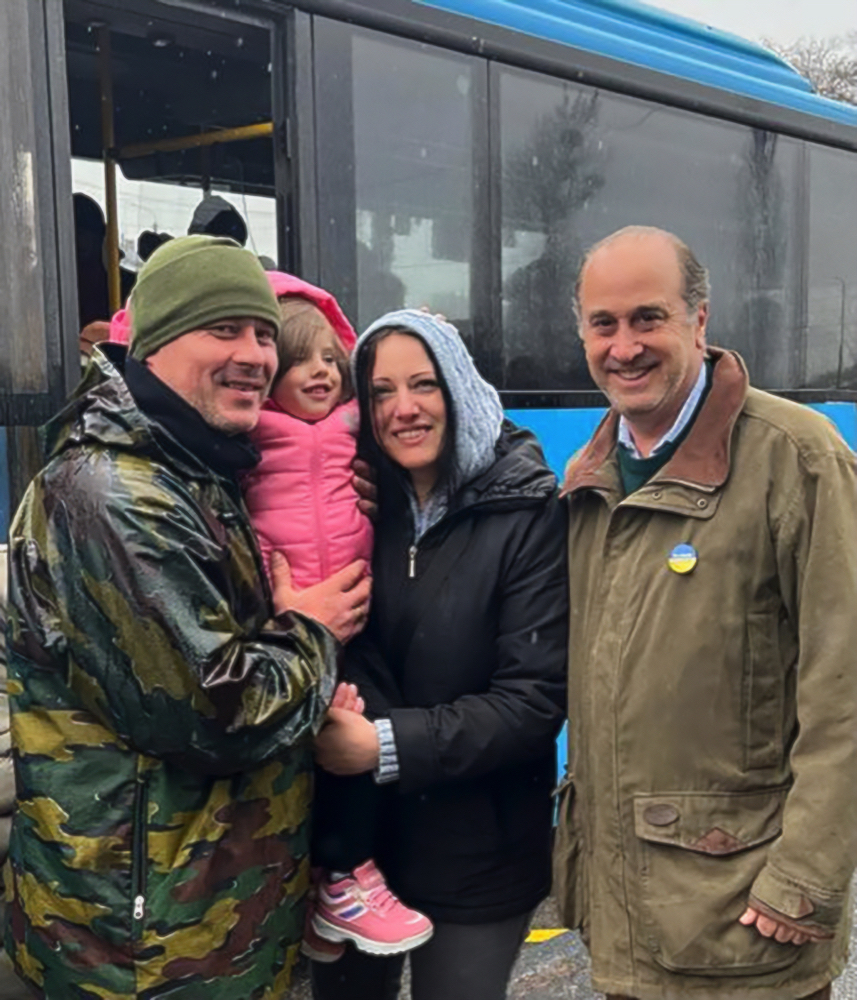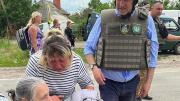“When I see a problem I have this urge to solve it no matter how formidable it might be,” says Brooks Newmark ’80, M.B.A. ’84. “While I don’t have an official charity organization behind me, I have a lot of energy.”
Newmark, a transplanted American who was formerly the Minister for Civil Society in the government of British prime minister David Cameron and a member of Parliament, was describing the most formidable problem he has ever taken on, either as a government officer or private citizen: that of shepherding Ukrainian women, children, and the elderly caught up in the war that has devastated their country out of harm’s way.
Newmark, a successful businessman before he entered public service, working with a Latvian friend, has been astonishingly successful. As of this writing, they and the Dunkirk-like fleet of 16 Ukrainian and Lithuanian buses they have improvised, along with a dedicated cadre of helpers, have moved more than 14,000 people of all ages, including several hundred orphans and amputees, away from the war zone to safety, often under fire.
At one point, Newmark recalls, a Russian mortar bomb landed several hundred feet from his car while he was driving to the border of the Russian-occupied zone in Kharkov Oblast. “That certainly brought home the reality of the war,” he says. “Until then I had thought that I was personally immune from just about anything.”
That has not stopped Newmark, who Moshe Azman, the Chief Rabbi of Kiev, has called the Oskar Schindler of Ukraine, after the Holocaust rescuer hero. Newmark himself shies away from that title while acknowledging that he is impelled by his own Holocaust history. “I had family from Poland and Lithuania who perished in the Holocaust,” he says. “What happened at that time is hardwired into the consciousness of Jews of my generation. But also hardwired into me is the notion that there were some who stood up to be counted in the Jewish people’s hour of need. Now I would like to think that I am one of those who is standing up for the Ukrainian people in their hour of need.”

Newmark with a Ukranian family
Photograph courtesy of Brooks Newmark
Newmark’s Ukrainian project is not the first humanitarian mission in which he has invested his time and personal wealth. Though based in London, he has previously worked at a Syrian refugee camp in Turkey, helped to rebuild an orphanage in Pakistan, and renovated a children’s home in Sarajevo. Prior to Ukraine, his most sustained effort had been in Rwanda, where he opened and financed a primary school for 300 children, a teacher-training center, and an education charity which he frequently visits and oversees.
Still, none of these quite prepared him for what he would see and experience, or how engrossed he would become, once he arrived in Ukraine in March. Newmark was actually in Rwanda completing research for his doctorate in education policy at Oxford when he saw a post from his Latvian friend, who had volunteered to transport Ukrainian refugees to safety and decided to pitch in.
“This experience has been like mission creep for me,” he says. “What started off as a few days on the Polish Ukrainian border has now developed into an all-consuming call to arms, as well as a life-changing—and most urgently, life-saving experience,” in Europe’s worst land war since World War II. “The utter devastation of civilian areas early in the war, especially in Bucha, Irpin, and Bordyanka—the towns near Kiev—really got to me,” he recalls, still haunted at the memory. “Every house had been blown up. Most shocking of all was seeing a mass war grave in Bucha and knowing that there were 458 bodies buried there.”
“The sight of a solitary shoe lying on top of the mud really struck me for some reason,” he says, his voice trailing off.
“The Russians are beyond evil,” says Newmark flatly, “and [Vladimir] Putin is devoid of any humanity. He is willing to kill as many Ukrainians as possible to get control of Ukraine. He simply does not want Ukraine to exist as a sovereign nation.”
Newmark, along with his ad hoc Latvian-Swedish team, helped guide more than a thousand people through a live minefield to safety in the eastern Kharkov region in July. “The evacuation had taken weeks of meticulous planning,” he recalls. ‘The day before I was supposed to get them through the no-man’s land between the Russian Ukrainian check points I discovered that there were 500 meters of anti-tank mines between them. Fortunately, I managed to persuade the Ukrainian military to create a path through the minefield.
“We then waited and waited. Suddenly coming around the corner towards our checkpoint were a few elderly ladies, a mother with two children, a twenty-something-year-old woman with two Alasatian dogs, followed by more and more women, children and pets and the odd elderly man. We waited until there were about 200 people at the check point. I couldn’t believe it! This was actually happening. Amazingly, 1,015 women and children ultimately took the risk to walk through the path I had organized for them.”
And how does Newmark’s family feel about the risk he takes when he flies to Ukraine to continue with his campaign? “I think my family is proud of what I am doing,” he says, referring to his wife, Lucy, and their five children, Benjamin ’10, M.B.A. ’16, Sam ’14, Max, Lucy, and Zachary. His wife, he says, "has been with me for 40 years and knows me well enough to understand that I am happiest when I am out doing something to solve problems.”








